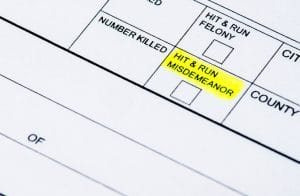Learn what you should do if you have been involved in a collision to avoid criminal charges.
For most of us, driver’s education class seems like quite a long time ago. Many California drivers know how to safely operate their vehicles and comply with the basic rules of the road, but they do not remember the specific laws and regulations, like exactly how far away from a fire hydrant they must park. Another example of something that many Californians may not remember from driver’s ed is what you are supposed to do in the event of an accident. While we may have known at one point, either time or anxiety after an accident means that many of us do not do the right thing after a collision. When it comes to leaving the scene of an accident, not following the law can lead to criminal charges.
Under California law, you can be charged with a misdemeanor or a felony offense if you leave the scene of an accident without first identifying yourself to the other party or parties involved. It is a misdemeanor offense if another person’s property was damaged in the accident, and a felony offense if another person (other than you) was injured or killed in the accident. These laws apply regardless of who was at fault, the seriousness of the injuries and the amount of damage.
These laws can have harsh consequences, particularly for someone who did not realize that they had to stop because they were not at fault for the accident. For example, if you were involved in a minor accident where the other person backed into your car at low speed in a parking lot, and you drove away because you did not believe that there was much damage, you could theoretically be charged with a hit and run. You could also be charged with a hit and run if you caused an accident even if your car was not involved, such as if you made a turn without signaling, and the car behind you was rear-ended as a result.
When hit and run is charged as a misdemeanor offense, it typically results in up to three years of informal probation and a fine of up to $1,000, along with 2 points on your driving record. You may also be required to pay restitution to the person whose property you damaged. In some cases, you may be sentenced to up to 6 months in county jail. For felony hit and run cases, the penalty can include a fine of up to $10,000 and a prison term of up to four years.
If you are involved in an accident, you have three specific duties under California law. You should immediately stop your car, and give the other party or parties your identifying information (name and current address). If they ask for this information, you should also provide your driver’s license and vehicle registration number. Doing these things will fulfill your duties under California law and prevent you from being charged with a misdemeanor or felony hit and run offense. Importantly, you should do this regardless of whether or not you are at fault in the accident.
An experienced California criminal defense attorney can assist you if you have been charged with a felony or misdemeanor hit and run offense. Contact the Chambers Law Firm today at 714-760-4088 or dchambers@clfca.com to schedule a free initial consultation and learn how we can help defend you against these charges.





